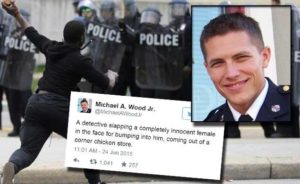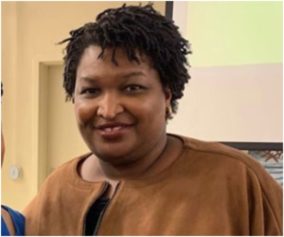Michael A. Wood, Jr., a retired Baltimore detective and founder of the Police Leadership Association, has taken to Twitter to expose corruption and brutality on the force he used to serve. But Tweets are not nearly enough. If this former cop does not provide dates, names and locations, and provide leadership in the struggle to bring down police corruption, he is merely hiding behind his white privilege.
Twitter has become a powerful tool and venue for activists in the #BlackLivesMatter movement for those who seek to galvanize supporters, raise awareness and bring about changes in the way law enforcement does business in Black, Latino, poor and working communities. On June 24, Wood began to give hints about the things he witnessed on the force.
“So here we go,” said the ex-detective and U.S. Marine to his Twitter followers. “I’m going to start Tweeting the things I’ve seen & participated in, in policing that is corrupt, intentional or not.”
The following are examples of what he said:
“A detective slapping a completely innocent female in the face for bumping into him, coming out of a corner chicken store.”
“Targeting 16-24 year old black males essentially because we arrest them more, perpetrating the circle of arresting them more.”
“Jacking up and illegally searching thousands of people with no legal justification”
“Having other people write PC statements, who were never there because they could twist it into legality.”
“Summonsing officers who weren’t there so they could collect the overtime.
“Pissing and sh—ing inside suspects homes during raids, on their beds and clothes.”
One person responded to the ex-cop’s tweets and their larger significance, saying, “According to you, this corruption is so widespread, yet you’re entirely willing to allow those officers to continue it.”
Wood responded, “I’m retired. I hope that the open discussion can influence at least some minds currently out there.”
As Salon reported, in a May 2015 interview with David Smalley on the podcast, Dogma Debate, Wood referenced some of the troubling police behavior he witnessed in the department, also calling for an end to the “war on drugs” and identifying a lack of empathy among cops as a primary reason for police misconduct.
There are examples of police officers who boldly penetrate the blue wall of silence and speak out against the wrongdoing in their midst. If any reform is to take place in police departments throughout the country—and if we expect any fundamental changes in the relationship between the police and the community—reform-minded police must play a role. However, as is the case with any gang or organized crime syndicate, police are unforgiving to whistleblowers—or “rats” as they call them. And still, they must speak.
Perhaps the most legendary case of whistleblowing is that of Frank Serpico, the child of Italian immigrants who blew the lid off of corruption in the New York Police Department in the 1960s and 1970s, leading to the investigation of that police force by the Knapp Commission.
After writing about pervasive police corruption in the New York Times, Serpico was shot in the face during a drug raid, leaving him deaf in one ear—an apparent set up by his fellow officers. Police then harassed him from his hospital bed.
“The problem is that the atmosphere does not yet exist… in which an honest police officer can act… without fear of ridicule or reprisal from fellow officers. Police corruption cannot exist unless it is at least tolerated… at higher levels in the department,” Serpico testified.
Another example is the case of Daisy Boria, who testified in the 1996 trial of NYPD officer Francis Livoti, who was charged with the chokehold murder of Anthony Baez in the Bronx. Boria, who is Latina, was on the scene when Livoti strangled Baez, also Latino, to death for accidentally hitting his police car with a football.
As the late 60 Minutes host Ed Bradley reported, for 16 years Boria “routinely turned a blind eye to what she saw—everything from police officers who stole money from drug dealers to cops who assaulted civilians without provocation.”
However, in this situation, Boria provided testimony that contradicted the other officers. For telling the truth, she was forced out of the 46th Precinct because of death threats she received from other officers. Boria’s captain told her he could not protect her. Although Livoti was acquitted, he was later tried and convicted in federal court and was imprisoned for seven years.
Serpico and Boria provide role models for Wood, for they are heroes for standing up against dirty policing. Moreover, they refused to abide by the traditional role of the police in American society, which for Black people has been the slave patrols. And for the working class, the police have served as the goon squad, hired to do the bidding of the wealthy, bash in heads and crush dissent among workers.
White police officers may hide behind their white skin, shield and blue uniform, and defer to the racist status quo. Likewise, some officers of color may fear retribution if they stand up and speak out, while others will internalize the white supremacy of the police force and participate in the corruption and brutality against their own communities. And yet, there are examples of Black and Latino officers who, as targets of racial profiling and victims of police abuse themselves, serve their community and speak out against brutality.
Those who work in law enforcement are a part of the system, and have an obligation to make things right.



